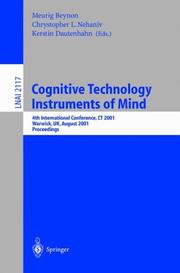| Listing 1 - 1 of 1 |
Sort by
|

ISBN: 3540424067 3540446176 Year: 2001 Publisher: Berlin, Heidelberg : Springer Berlin Heidelberg : Imprint: Springer,
Abstract | Keywords | Export | Availability | Bookmark
 Loading...
Loading...Choose an application
- Reference Manager
- EndNote
- RefWorks (Direct export to RefWorks)
Cognitive Technology: Instruments of Mind Cognitive Technology is the study of the impact of technology on human cog- tion, the externalization of technology from the human mind, and the pragmatics of tools. It promotes the view that human beings should develop methods to p- dict, analyse, and optimize aspects of human-tool relationship in a manner that respects human wholeness. In particular the development of new tools such as virtual environments, new computer devices, and software tools has been too little concerned with the impacts these technologies will have on human cog- tive and social capacities. Our tools change what we are and how we relate to the world around us. They need to be developed in a manner that both extends human capabilities while ensuring an appropriate cognitive t between organism and instrument. The principal theme of the CT 2001 conference and volume is declared in its title: Instruments of Mind. Cognitive Technology is concerned with the interaction between two worlds: that of the mind and that of the machine. In science and engineering, this - teraction is often explored by posing the question: how can technology be best tailored to human cognition? But as the history of technological developments has consistently shown, cognition is also fashioned by technology. Technologies as diverse as writing, electricity generation, and the silicon chip all illustrate the profound and dynamic impact of technology upon ourselves and our conceptions of the world.
Cognition --- Cognitive science --- Human information processing --- Artificial intelligence --- Psychology --- Social Sciences --- Computer science. --- Database management. --- User interfaces (Computer systems). --- Artificial intelligence. --- Computer graphics. --- Education --- Computers and civilization. --- Computer Science. --- Database Management. --- Artificial Intelligence (incl. Robotics). --- User Interfaces and Human Computer Interaction. --- Computers and Society. --- Computers and Education. --- Computer Graphics. --- Data processing. --- Education. --- Artificial Intelligence. --- Informatics --- Science --- Automatic drafting --- Graphic data processing --- Graphics, Computer --- Computer art --- Graphic arts --- Electronic data processing --- Engineering graphics --- Image processing --- Children --- Education, Primitive --- Education of children --- Human resource development --- Instruction --- Pedagogy --- Schooling --- Students --- Youth --- Civilization --- Learning and scholarship --- Mental discipline --- Schools --- Teaching --- Training --- AI (Artificial intelligence) --- Artificial thinking --- Electronic brains --- Intellectronics --- Intelligence, Artificial --- Intelligent machines --- Machine intelligence --- Thinking, Artificial --- Bionics --- Digital computer simulation --- Logic machines --- Machine theory --- Self-organizing systems --- Simulation methods --- Fifth generation computers --- Neural computers --- Data base management --- Data services (Database management) --- Database management services --- DBMS (Computer science) --- Generalized data management systems --- Services, Database management --- Systems, Database management --- Systems, Generalized database management --- Digital techniques --- Education—Data processing. --- Civilization and computers --- Interfaces, User (Computer systems) --- Human-machine systems --- Human-computer interaction --- User interfaces (Computer systems)
| Listing 1 - 1 of 1 |
Sort by
|

 Search
Search Feedback
Feedback About UniCat
About UniCat  Help
Help News
News